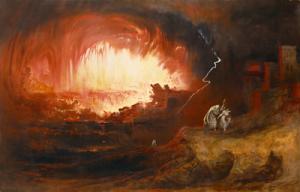 Tonight, I was reading through chapters three through five of Lamentations and Hebrews eight and I noticed a giant correlation between these chapters in both the Old and New Testaments. The lesson of Lamentations, or at least one lesson amongst many, is that God is serious about sin and its resultant judgment. If you test Him with your unrepentant sin, He will bring you to nothing, mercifully emptying you in hopes that you will see His faithfulness to keep you from pursuing that which injures the glory of God and thus you. Yet if you continue in it, He may be done mercifully intervening with trials that He means to move you toward repentance and faith and trust in Him and thus leave you to your sin. This is a frightening prospect and is in itself judgment.
Tonight, I was reading through chapters three through five of Lamentations and Hebrews eight and I noticed a giant correlation between these chapters in both the Old and New Testaments. The lesson of Lamentations, or at least one lesson amongst many, is that God is serious about sin and its resultant judgment. If you test Him with your unrepentant sin, He will bring you to nothing, mercifully emptying you in hopes that you will see His faithfulness to keep you from pursuing that which injures the glory of God and thus you. Yet if you continue in it, He may be done mercifully intervening with trials that He means to move you toward repentance and faith and trust in Him and thus leave you to your sin. This is a frightening prospect and is in itself judgment.
This should give us great pause and reflection upon our own lives and the wickedness therein. We are depraved sinners, who, even in good things transgress His holy law with motives that are not set on exalting Christ and the glory of His grace in every way. We infinitely fall short of the glory of God. Praise Him there is mercy in Christ! But may we not be evil and abuse it to our detriment! We must be on our guard.
So the overall theme of Lamentations is that God does judge sin (being that the book was written in the aftermath of God’s punishment against Jerusalem), even in those He had made a covenant with. Yet He is faithful to those who mourn their sin and seek Him, who wait on Him to act in their hearts and thus turn from those things which displease Him, only by His power. He is faithful to forgive us our debts, yet He is a just judge who rightfully acts for His own glory and name (for what in the universe is there that is better to stand up for than the glory of God and His honor?).
In Hebrews, we have an excellent picture of Christ fulfilling the old covenant within the new. But before I get to that, we must understand the old covenant first. The old covenant, the very covenant that the people of Jerusalem had broken prior to God judging them, which happened right before the context of Lamentations, is where God said, “If you are faithful and perform all that I have commanded according to this covenant, things will go well with you; if you don’t, they won’t go well with you and I will inflict my wrath upon you (my paraphrase if you can’t tell).” And that is exactly what God does.
Prior to Lamentations, Jerusalem had done what was evil in the sight of the Lord and their hearts were far from Him, disbelieving Him and turning to worthless idols and wickedness. Therefore, in anger that the Lord slowly and patiently held back, not desiring to inflict wrath on them from His heart because He loved them, He waited no longer and punished them to defend the honor of His name. And this wasn’t just a quick deal. He inflicted wrath on them worse than that of Sodom! With Sodom at least the Lord consumed them with fire and that was it. But with Jerusalem, their pain and misery lasted a long time. And it was ugly. People died of starvation and even ate their own children, amongst other things. Yeah, it was bad. People that had lived in luxury were now begging on the streets and their children were starved with no where to turn. The Lord had brought them to nothing and they were the scorn of the nations.
The Lord takes His glory, honor and name seriously. He is just. This is little studied attribute of God these days, yet it is vital to get this before we can get His amazing grace. If we defile His glory and honor with our words, thoughts, actions, and deeds, He will consume us with His burning anger. Even now, in the time after Christ’s sacrifice and resurrection, is this the case. He is the same now as He was then. This is very sobering and should display to us the unfathomable justice of His character and the utter wickedness and proneness to sin of our own hearts.
Yet, the whole reason Christ came was precisely because the old covenant with all of its regulations and stipulations, could never be upheld by mankind in order to attain salvation. We are a doomed people if we attempt to win favor with God through our religious working and toiling. Just look at Jerusalem in Lamentations!
But why is this so? Because by our works, even the best that we can offer for a lifetime of good deeds, cannot make us right with this just and holy God presented to us in Lamentations (who is the same God today). Our offense against God is infinite, so even one transgression is punishable forever. Yet how many sins do we commit every minute? “Without faith it is impossible to please God” (Hebrews 11:6). So without faith, even our good deeds are filthy rags (Isaiah 64:6).
But Christ came and fulfilled the covenant from our side precisely because we were unable to. All religions, in some measure, say the exact same thing, just in different ways. “Do this to get right with God, or to become (a) god,” or some other variation. And in fact, the first covenant said something to this effect. Regardless, the message is the same. But in the Gospel that God had unraveled over the course of history, by the work of Christ, the Son of God becoming a man, He did everything perfectly on our behalf and even took the punishment that we deserve in Himself at the cross, and rose from the grave proclaiming victory over death – all this for those who believe and trust in Him alone.
Without Christ we are hopeless, just as Jerusalem was in Lamentations, save God’s mercy toward them. As Hebrews 8:7 says, “For if that first covenant had been faultless, there would have been no occasion to look for a second.” Indeed. Then as it says right before this verse in Hebrews 8:6, “But as it is, Christ has obtained a ministry that is as much more excellent than the old as the covenant he mediates is better, since it is enacted on better promises.” And that promise is the hope of the glory of God for all eternity. Nothing can satisfy the human soul more. It is what we were made for!
The new and final covenant is a covenant in which instead of God telling us to do this and do that to get right with Him (as in the first covenant, the old one), Christ Himself fulfills and does it all perfectly on behalf of those who trust Him for salvation! And not only so, but He also takes the punishment that we earned for our wrong-doing against God in Himself on the cross, removing all obstacles between us and Him forever. And you think the picture in Lamentations of God’s judgment is dreadfully awful? We have absolutely no idea how infinitely and dreadfully awful the cross was for Jesus who experienced the wrath of God for us who believe in Him. And He did all this in love toward us, that we might glorify and enjoy Him forever, the very hope of heaven itself.
Christ is our only hope of salvation, for it is He who attained it for us. And this very grace in the Gospel is the only way to change from the heart and grow in His grace. May we turn to the Lord and seek His infinite grace to save and deliver us, both those who have yet to trust Him, as well as those who have.

 After these things God tested Abraham and said to him, “Abraham!” And he said, “Here am I.” 2 He said, “Take your son, your only son Isaac, whom you love, and go to the land of Moriah, and offer him there as a burnt offering on one of the mountains of which I shall tell you.” 3 So Abraham rose early in the morning, saddled his donkey, and took two of his young men with him, and his son Isaac. And he cut the wood for the burnt offering and arose and went to the place of which God had told him. 4 On the third day Abraham lifted up his eyes and saw the place from afar. 5 Then Abraham said to his young men, “Stay here with the donkey; I and the boy will go over there and worship and come again to you.” 6 And Abraham took the wood of the burnt offering and laid it on Isaac his son. And he took in his hand the fire and the knife. So they went both of them together. 7 And Isaac said to his father Abraham, “My father!” And he said, “Here am I, my son.” He said, “Behold, the fire and the wood, but where is the lamb for a burnt offering?” 8 Abraham said, “God will provide for himself the lamb for a burnt offering, my son.” So they went both of them together.
After these things God tested Abraham and said to him, “Abraham!” And he said, “Here am I.” 2 He said, “Take your son, your only son Isaac, whom you love, and go to the land of Moriah, and offer him there as a burnt offering on one of the mountains of which I shall tell you.” 3 So Abraham rose early in the morning, saddled his donkey, and took two of his young men with him, and his son Isaac. And he cut the wood for the burnt offering and arose and went to the place of which God had told him. 4 On the third day Abraham lifted up his eyes and saw the place from afar. 5 Then Abraham said to his young men, “Stay here with the donkey; I and the boy will go over there and worship and come again to you.” 6 And Abraham took the wood of the burnt offering and laid it on Isaac his son. And he took in his hand the fire and the knife. So they went both of them together. 7 And Isaac said to his father Abraham, “My father!” And he said, “Here am I, my son.” He said, “Behold, the fire and the wood, but where is the lamb for a burnt offering?” 8 Abraham said, “God will provide for himself the lamb for a burnt offering, my son.” So they went both of them together. Tonight, I was reading through chapters three through five of Lamentations and Hebrews eight and I noticed a giant correlation between these chapters in both the Old and New Testaments. The lesson of Lamentations, or at least one lesson amongst many, is that God is serious about sin and its resultant judgment. If you test Him with your unrepentant sin, He will bring you to nothing, mercifully emptying you in hopes that you will see His faithfulness to keep you from pursuing that which injures the glory of God and thus you. Yet if you continue in it, He may be done mercifully intervening with trials that He means to move you toward repentance and faith and trust in Him and thus leave you to your sin. This is a frightening prospect and is in itself judgment.
Tonight, I was reading through chapters three through five of Lamentations and Hebrews eight and I noticed a giant correlation between these chapters in both the Old and New Testaments. The lesson of Lamentations, or at least one lesson amongst many, is that God is serious about sin and its resultant judgment. If you test Him with your unrepentant sin, He will bring you to nothing, mercifully emptying you in hopes that you will see His faithfulness to keep you from pursuing that which injures the glory of God and thus you. Yet if you continue in it, He may be done mercifully intervening with trials that He means to move you toward repentance and faith and trust in Him and thus leave you to your sin. This is a frightening prospect and is in itself judgment.